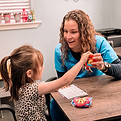Services
Pediatric & Youth Speech and Language Therapy
Specializing in the treatment and evaluation of children and adults ages 16 month to geriatrics with difficulties in one or more of the following areas:
SPEECH
Articulation Disorder
Atypical speech development that may include sound substitutions, omissions, additions, transpositions, and distortions. One error or many may make it difficult for others to understand your child.
Childhood Apraxia of Speech
A motor planning disorder that makes it challenging to produce the movements necessary for speech production. You may notice errors that are inconsistent, difficulty with vowels, or unusual movements or the lips and tongue.
Phonological Disorder
Patterns of speech production employed by young children as a means to simplify speech that are utilized past the age at which most children have outgrown them. Children often delete the beginning or ending sounds of words, use only a handful of sounds to represent many, or use a "w" sound for "r" and "l."



LANGUAGE
A significant impairment in the ability to comprehend and/or use spoken language, also known as listening and speaking.

Oral Language Disorder

Receptive-Expressive Language Disorder

Developmental Language Disorder

Language Delay

Late Talkers
Impairments may occur across any of the five language domains:
-
Phonology - Understanding and developing the rules for the sound system in a language - these are the precursors to reading acquisition, also known as phonological awareness. Your child may struggle with rhyming, hearing differences between sounds, or segmenting, blending, and manipulating sounds in words.
-
Morphology - Understanding and using the smallest units of language, such as -s to mark plurals, -ed to mark regular past tense, and small words such as pronouns and articles. Your child may use incorrect pronouns, have difficulty relaying past tense, or may have difficulty following directions containing age-appropriate prepositions (e.g., in, on, under)
-
Syntax - Understanding and using correct word order and complex sentence structure. Your child may mix up words in sentences, struggle to understand complex language, or use only simple sentences to relay their thoughts.
-
Semantics - Understanding and relaying of meaning - vocabulary and content. Your child may struggle to understand stories read aloud, acquire new vocabulary, or may struggle to retrieve the correct words when speaking.
-
Pragmatics - Understanding and using language in context. Your child may struggle with taking conversational turns, maintaining a topic, or experience difficulty understanding facial expressions and body language.


